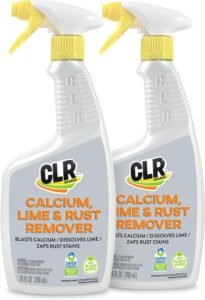Editors Note:At Crystal Clear Water HQ through our partners we may receive a commission through items purchased, We our a amazon associate
5 Effects of Hard Water In Your Home
Have you ever wondered what effects hard water can have on your home? Are you aware of the potential damage it can cause to your plumbing system and your quality of life? Prepare to be surprised as we uncover the 7 effects of hard water that may be lurking in your home, affecting everything from your skin and hair to your water bills.
Key Takeaways:
- Hard water can cause scale buildup on plumbing fixtures and appliances, affecting their performance and your water’s taste.
- The mineral content in hard water can leave your skin dry and your hair feeling slimy.
- Faded clothes and a decrease in fabric lifespan are common effects of hard water.
- Stains on sinks and bathtubs are unsightly reminders of the mineral residue left behind by hard water.
- Hard water can lead to frequent plumbing repairs and higher water bills as your plumbing system struggles to cope with the mineral buildup.

Our Number One Choice for Removing Hard Water

Scale Buildup on Plumbing Fixtures and Appliances
One of the most visible effects of hard water is the scale buildup it causes on your plumbing fixturesand appliances. When hard water flows through your faucets, showerheads, and other plumbing fixtures, it leaves behind mineral deposits that accumulate over time.
This scale buildup is not only unsightly, but it can also have detrimental effects on the functionality of your fixtures and appliances. The minerals in the hard water, such as calcium and magnesium, can clog the small openings in faucets and showerheads, leading to reduced water flow and weak water pressure.
Appliances like coffee pots and dishwashers are also prone to scale buildup. The minerals in hard water can form a layer of scale inside these appliances, affecting their performance and lifespan. Coffee pots may suffer from slower brewing times and diminished flavor, while dishwashers may struggle to clean dishes effectively.
Moreover, the mineral deposits left behind by hard water can affect the taste of your water. They can give your tap water a metallic or bitter flavor, which can be unappealing when used for drinking or cooking.
“The scale buildup from hard water affected my shower experience. The water pressure decreased significantly, and I had to constantly clean the showerhead to unclog the mineral deposits. It was frustrating and time-consuming.” – Michelle, homeowner
To mitigate the effects of scale buildup on your plumbing fixtures and appliances, it’s important to address the root cause: hard water. Investing in a water softener is often the most effective solution. A water softener removes the excessive minerals from the water, preventing scale buildup and preserving the longevity of your fixtures and appliances.
| Effects of Scale Buildup | Consequences |
|---|---|
| Reduced water flow and pressure | – Faucets and showerheads become less efficient – Inconsistent water supply – Longer wait times for tasks like filling up a pot or taking a shower |
| Diminished performance of appliances | – Slower brewing times for coffee pots – Inefficiency in dishwashers resulting in partially cleaned dishes |
| Altered taste of water | – Metallic or bitter flavor – Unpleasant drinking and cooking experience |
| Increased maintenance and cleaning efforts | – Regular cleaning required to remove mineral deposits from fixtures – Longer cleaning cycles for appliances to remove scale buildup – Additional expenses for cleaning agents |
To Get Info and pricing about our best product for cleaning hard water build up click here
Dry Skin and Hair
The excess calcium and magnesium in hard water can have detrimental effects on your skin and hair. When you wash with hard water, it can leave a residue on your skin, preventing it from properly absorbing moisture and essential oils. As a result, you may experience dry, tight, and itchy skin.
In addition to dry skin, hard water can also leave your hair feeling dull, brittle, and difficult to manage. The minerals in the water create a coating on your hair shaft, preventing moisture from penetrating effectively. This can lead to frizzy, unmanageable hair that lacks shine and vitality.
To combat the effects of hard water on your skin and hair, it’s essential to take extra care and use suitable products. Look for moisturizing cleansers and shampoos that are specifically formulated for dry or damaged hair. These products can help replenish moisture and protect your skin and hair from further dryness.
Incorporating a weekly deep conditioning treatment and using leave-in conditioners can further nourish your hair and restore its natural moisture balance. Additionally, using a good quality moisturizer after showering can help hydrate your skin and prevent dryness caused by hard water.
Remember, while hard water may be affecting your skin and hair, you have options to combat its effects. By using appropriate products and maintaining a consistent skincare and haircare routine, you can minimize the impact of hard water and keep your skin and hair looking healthy and vibrant.
For More info on the best dry skin and face moisturizer click here
Hard water can have a detrimental effect on your clothes, causing them to fade and lose their vibrancy. The high mineral content in hard water can damage the fabric, resulting in a shorter lifespan for your clothing.
When you wash your clothes in hard water, the minerals can strip away the color, leaving your garments looking dull and washed out. This is particularly noticeable with dark or vibrant-colored clothing. Additionally, the rough texture of the minerals can make your clothes feel scratchy and uncomfortable against your skin, affecting your overall comfort while wearing them.
To prevent your clothes from fading and experiencing the negative effects of hard water, there are several solutions you can try. One option is to use a water softener, which can help remove the excessive minerals from the water and make it gentler on your clothes. Another solution is to add a water conditioner or a laundry rinse aid to your washing machine, which can help counteract the effects of hard water and protect your clothing from fading.
Pro Tip: If you’re dealing with faded clothes due to hard water, you can also try using a fabric dye to revive the color of your garments
Hard Water Solutions for Faded Clothes:
- Install a water softener to reduce the mineral content in your water.
- Add a water conditioner or laundry rinse aid to your washing machine.
- Consider using a fabric dye to restore the color of your faded clothes.
| Effects of Hard Water on Clothes | Hard Water Solutions |
|---|---|
| Fading of clothes | Install a water softener Add a water conditioner or laundry rinse aid |
| Loss of vibrancy | Use a fabric dye to restore color |
| Scratchy texture | Install a water softener Add a water conditioner or laundry rinse aid |
Our Number One Choice for Removing Hard Water

Stained Sinks and Bathtubs
Hard water can leave unsightly stains on your sinks and bathtubs. The mineral residue from the water can build up over time, causing discoloration and making your fixtures appear dingy. These stains can be particularly stubborn and difficult to remove, requiring frequent cleaning to keep your bathroom looking fresh and clean.
If left untreated, hard water stains can become more severe and deeply embedded, making them even harder to eliminate. Regular cleaning products may not be effective in removing these stubborn stains, requiring the use of stronger chemicals or abrasive scrubbing. However, using harsh chemicals or abrasive methods can potentially damage the surface of your sinks and bathtubs, leading to further deterioration.
But don’t worry, there is a solution!
Preventing hard water stains is more efficient than constantly battling with them. Installing a water softener can help to alleviate the problem. A water softener works by removing the mineral content from the water, preventing stains from forming in the first place. This not only saves you time and effort on cleaning but also protects the longevity and appearance of your sinks and bathtubs.
| Stained Sinks and Bathtubs | Hard-Water Prevention Solutions | |
|---|---|---|
| Stains | Stubborn and difficult to remove | Prevented from forming in the first place |
| Cleaning Effort | Requires frequent cleaning and potentially harsh chemicals | Reduces the need for constant cleaning |
| Surface Damage | Potential for damage from abrasive cleaning methods | Protects the appearance and longevity of fixtures |
Make the smart choice and invest in a water softener to prevent stained sinks and bathtubs. Not only will it save you time and effort, but it will also keep your bathroom looking pristine.
Frequent Plumbing Repairs and Higher Water Bills
When it comes to hard water, the effects go beyond just the visible signs. One of the significant impacts is the damage it can cause to your plumbing system, leading to frequent repairs. The minerals present in hard water can build up within your pipes and fixtures over time, hindering water flow and causing corrosion. As a result, you might start experiencing leaks, cracked pipes, or even reduced water pressure.
Not only can these plumbing repairs be inconvenient, but they can also add up to significant expenses. Repairing and replacing damaged pipes and fixtures can be costly, not to mention the inconvenience of dealing with plumbing issues on a regular basis.
Furthermore, hard water can also contribute to higher water bills. As the mineral buildup restricts water flow, your plumbing system has to work harder to provide you with the necessary water pressure. This extra effort leads to increased water consumption and ultimately higher water bills.
The good news is that there are preventive measures you can take to minimize these issues. Investing in a water softener is an effective solution that can help prevent the damaging effects of hard water on your plumbing system. By removing the minerals responsible for the hardness of water, you can protect your pipes, fixtures, and appliances from potential damage, thereby reducing the need for frequent plumbing repairs.
In addition, using a water softener can result in more efficient water usage, reducing the strain on your plumbing system and ultimately lowering your water bills. By addressing the root cause of hard water, you can not only save money but also enjoy the benefits of a properly functioning plumbing system.
FAQ
What are the effects of hard water in your home?
The effects of hard water include scale buildup on plumbing fixtures and appliances, dry skin and hair, faded clothes, stained sinks and bathtubs, frequent plumbing repairs, a rise in water bills, and unsightly dishware.
How does hard water cause scale buildup on plumbing fixtures and appliances?
Hard water contains minerals like calcium and magnesium that can build up over time, resulting in scale deposits on faucets, showerheads, and appliances. These deposits can be unsightly and affect the taste of your water.
Why does hard water make your skin and hair feel dry?
Hard water is unable to effectively nourish your skin and hair, leading to dry and chapped skin, as well as brittle hair. The excess calcium and magnesium in the water can strip away moisture, leaving your skin and hair feeling uncomfortable.
How does hard water cause your clothes to fade?
The minerals present in hard water can damage the fabric of your clothes, leading to fading, fraying, and reduced longevity. The mineral residue can strip away the color and make your clothes feel scratchy.
What causes stained sinks and bathtubs in homes with hard water?
Hard water contains mineral deposits that can leave stains on sinks and bathtubs. These stains can be difficult to remove and require frequent cleaning. Using a water softener can help prevent these stains from occurring.
Why does hard water lead to frequent plumbing repairs and higher water bills?
The mineral buildup from hard water can affect the flow of water in your plumbing system and cause corrosion, leading to leaks and cracked pipes. Additionally, the strain on your plumbing system can result in higher water bills as it has to work harder to allow water to flow through.
How can I prevent or mitigate the effects of hard water?
One solution is to install a water softener, which can remove the excess minerals from your water and prevent scale buildup. You can also use vinegar or a descaling agent to clean your plumbing fixtures and appliances regularly. Additionally, using gentle and moisturizing skincare and haircare products can help alleviate the dryness caused by hard water.

